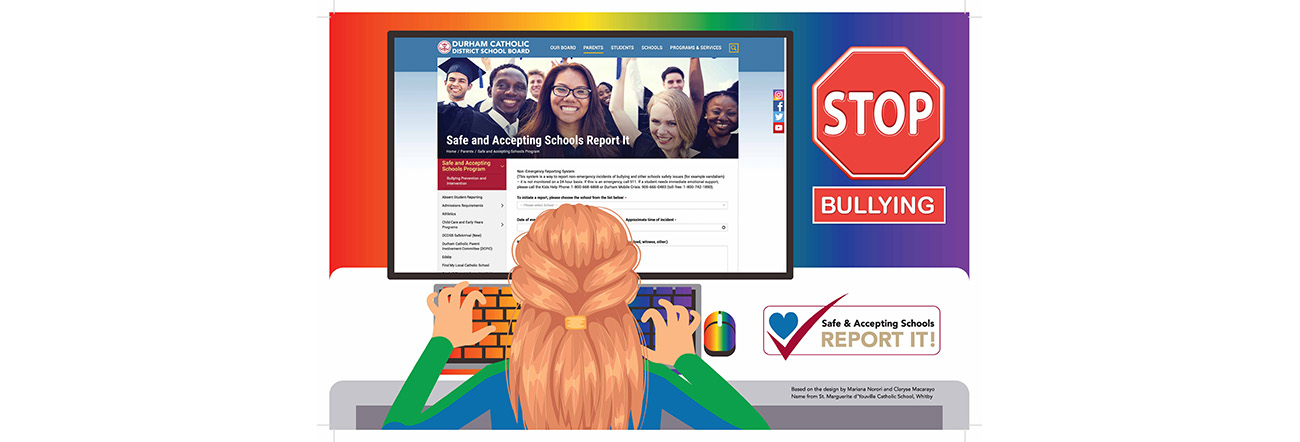
Everyone in our school community is responsible for implementing bullying and violence prevention policies and programs. Key roles involved in bullying prevention programs include:
- Principals and Vice-Principals: provide leadership in the administration of bullying prevention programs.
- Teachers and support staff: provide daily implementation and monitoring.
- Students: acquire the confidence and skills to recognize bullying and report it to an appropriate person (educator/adult).
- Parents, Guardians and Caregivers: act as partners in modelling consistent expectations.
- Police, neighbours, community organizations, local businesses and agencies: take an active role in supporting Safe School initiatives.
We have guidelines in place to help students deal with incidents of bullying, whether they are the victim, bystander or bully. We do not tolerate bullying on school property, at school related activities, on school buses or in any other circumstances such as online communication.
We provide constant involvement, progressive discipline and pro-social training to support students who bully and those who are victimized or bystanders.
Bullying Prevention and Intervention Strategic Plan
The DCDSB reviews and revises the board's Bullying Prevention and Intervention Strategic Plan annually. To find the most recent plan, please see the link below.
DCDSB Bullying Prevention and Intervention Strategic Plan
Report It
Report It is a tool for parents and students to advise staff of non-emergency incidents of bullying and other school safety issues (for example vandalism). It is not monitored on a 24/7 basis. In case of an emergency, call 911. If a student needs immediate emotional support, please call the Kids Help Phone: 1-800-668-6868 or York Support Services Network: 1-855-310-2673 or 1-866-323-7785. York Support Services Network offers the Community Crisis Response Service for persons who are having a mental health crisis, and their family or friends.
Our top priority is the safety and well being of all students. All students deserve to learn in a place where they feel safe. We want to know about incidents of bullying and other safety concerns so that we can take action and prevent further incidents from happening. We take issues of bullying and school safety very seriously.
Click here to Report a Bullying or Non-Emergency Incident
Resources for Families and Students
Click here to visit our Community Supports and Services webpage
Effects of bullying
Bullying negatively affects a student's:
- ability to learn;
- healthy relationships and school environment; and
- education.
Definitions
The following are definitions to explain the various forms of bullying.
Bullying (1.0.0.1) For the purposes of the definition of “bullying” in subsection (1), behaviour includes the use of any physical, verbal, electronic, written or other means.
Frequently Asked Questions
It is important that you address the situation adequately and safely. Your child may be nervous about involving you in the problem for the fear it might make things worse. Talk to your child about finding a friend that he/she trusts. Talk to the school. Make a plan together that safely addresses the problem. Ask the classroom teacher or school administrator for help. Our educators have a different outlook on what is happening and can ensure your child is safe, while dealing with problems immediately as they occur.
You may also wish to use our Report It tool to advise staff of any non-emergency incident(s) of bullying and other school safety issue (such as vandalism).
Our top priority is the safety and well being of all students. All students deserve to learn in a place where they feel safe. We want to know about incidents of bullying and other safety concerns so that we can take action and prevent further incidents from happening. We take issues of bullying and school safety very seriously.
Although bullying is not accepted in our schools, it does happen. It is important for students to assert themselves by speaking to try to resolve the situation. Students should always use their words to solve problems, and not resort to violence. When dealing with a bully, students are encouraged to remember the acronym PAL:
- P - pick a friend;
- A - assert yourself by speaking up; and
- L - let someone know.
Students are encouraged to:
- have a friend to play with at recess who can be an ally for them;
- tell the bully to stop; and
- tell an adult at school (teacher, supervisor on duty, principal, or another adult they trust).
